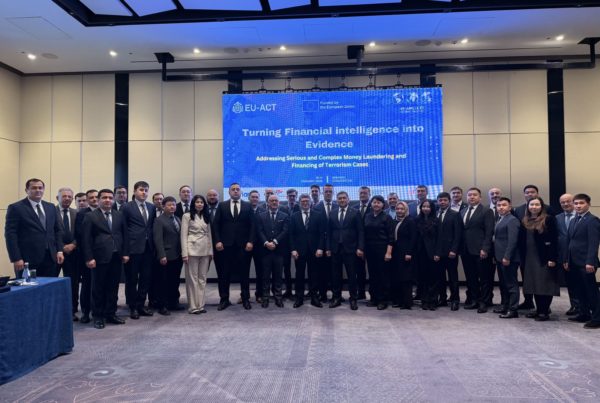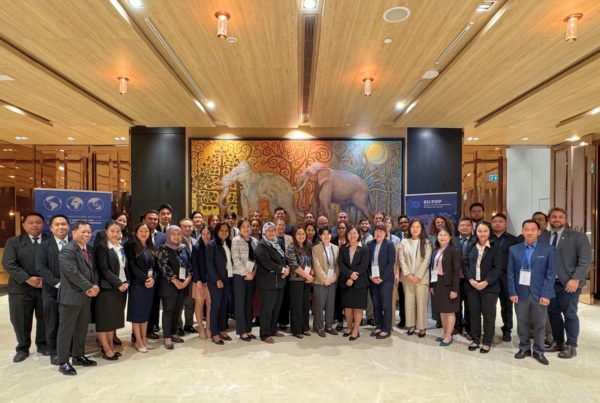When implemented wholistically, the Anti-Money Laundering (AML) standards of the Financial Action Task Force (FATF) should support countries in maintaining the integrity of the global financial system by ridding it of the proceeds of organised crimes. But strong AML systems are also well suited to tackling a related but distinct threat to financial integrity: the corrosive influence of kleptocrats who misuse their status, power and access to bleed the state of its resources and deprive its citizens.
Kleptocracy and Money Laundering
Kleptocracy can take many forms, whether it involves a former president’s daughter siphoning off the proceeds of the state oil company into personal accounts, or a sitting politician’s involvement in slowly bleeding the state’s sovereign wealth fund. Regardless of the precise activity, with the revenue generation capabilities of entire states at their disposal, kleptocrats stand to make incredibly vast sums for themselves, their families and their associates.
Corruption is easy enough to understand. Wherever a public official accepts a bribe to ignore wrongdoing or a politician awards a government contract to a friend promising a financial kickback, corruption is at play. But there are cases where misuse of one’s public office or influence reaches monumental proportions: enter the kleptocracy. Sometimes referred to as “grand corruption” to underscore its scale and magnitude, kleptocracy involves systematic misuse of high office by elites and their families for personal enrichment, typically involving the plundering of national wealth. Where political systems become contorted to enable elites to do so with impunity, a kleptocracy (rather than a democracy) is born.
“Kleptocracy is sometimes referred to as ‘grand corruption’ due to its scale and magnitude.”
As with those seeking to launder the proceeds of drug trafficking, cybercrime, modern slavery or any other organised crime, kleptocrats require avenues for legitimising their ill-gotten gains so that they may be enjoyed, typically far from their home countries. That’s where the implementation of the FATF’s AML standards can play a prominent preventative role.
The FATF and Countering Kleptocracy
The FATF recognises corruption and kleptocracy to be one of many co-called “predicate crimes”: the money-generating offense that gives rise to the need to launder its proceeds. Many of the standards’ emphasis on ensuring transparency in financial dealings are markedly useful for addressing kleptocracy.
Standards on beneficial ownership registries should help reduce the utility of complex corporate structures used by kleptocrats, as well as other criminals, to hide the provenance of illicit wealth. This is achieved by providing law enforcement authorities with a reliable guide for determining the natural person (a flesh and blood human) behind one or a series of companies or complex corporate vehicles.
Further, the FATF requires states to conduct enhanced due diligence on what it calls “Politically Exposed Persons” (PEPs), typically individuals “who have been entrusted with prominent public functions”, such as heads of state or government, senior politicians, executives of state-owned corporations, diplomats, or senior government, judicial or military officials. Given these individuals’ unique access to resources and capability to embezzle public funds – in other words, to engage in kleptocratic activity – the FATF requires extra scrutiny of their financial dealings for preventative purposes.
Meet ‘the Enablers’
Above all, in relation to countering kleptocracy, the FATF’s standards pertaining to customer due diligence (CDD), internal controls and supervision of the so-called “enablers” of illicit finance are noteworthy. Recommendations 22, 23 and 28 require states to place certain AML obligations onto the Designated Non-Financial Businesses and Professions (DNFBPs). Chief among these professions are lawyers, accountants and real estate agents, all three of which act as gatekeepers of the financial system and offer services of paramount importance and utility to kleptocrats trying to spirit away with their illicit wealth. Regardless of whether their involvement in facilitating kleptocracy is witting or unwitting, the FATF requires the enablers of illicit finance to know their clients and detect and report suspicious transactions, all under the supervision of a competent authority to ensure adherence to these obligations.
But how exactly do lawyers, accountants and real estate agents – three of the most prolific categories of professional enablers – make use of their offices to support kleptocrats?

1. Lawyers
The services of a good lawyer are virtually indispensable for a kleptocrat seeking to use inventive channels to steal, move and launder illicit wealth. Aside from defending their clients in court, lawyers may provide a wide range of transactional services to their clients. They may “acquire property, manage money, operate bank accounts, form trusts and companies and serve key roles in them” – all entirely legitimate services on the face of it.
Ill-intentioned professionals on the other hand may use their expert knowledge of AML systems to aid their clients in circumventing them, say, by incorporating a series of shell companies to obscure beneficial ownership and the provenance of funds. The involvement of a lawyer in such dealings may convey an air of legitimacy to outside parties, possibly prompting others to be more lax in their own due diligence.
Exposés such as the International Consortium of Investigative Journalists’ “Pandora Papers” showed how wealthy, well-connected world leaders, politicians and public officials made ample use of obliging law firms to open and funnel illicit wealth through off-shore companies.
2. Accountants
Accountants offer many of the same services to kleptocrats as lawyers, including company registration services used to mask the ultimate beneficial owner of a company, into whose bank account kleptocratic wealth has been deposited. Accountants working for major consulting firms have been known to advise clients on how to evade taxes through company structuring, making a hefty profit for themselves in the process.

3. Real Estate Agents
The purchase and sale of real estate can benefit kleptocrats hugely as a form of investment in a valuable, secure asset that is likely to appreciate, but also as a means of ultimately benefiting from their wealth. Whether for investment or enjoyment, real estate transactions can involve huge sums and be subjected to much less scrutiny than regular financial transactions, particularly when a property is bought outright in cash. When AML obligations are not fulfilled in such cases, real estate agents may accept and handle large volumes of cash for the sale without requiring clients to reveal the provenance of funds, as would be the case at any financial institution. Once brought to light, some of the most shocking stories of kleptocracy end with the purchase of luxurious properties in Western countries, distorting property markets in major cities in the process: a practical and direct impact of kleptocracy on the lives of ordinary people.
Making the Most of the FATF
Having tasked itself with responding to new and emerging threats to the integrity of the global financial system, in 2022 the FATF sought to better understand how its members were faring when it came to bringing the standards to bear on the challenge of corruption and kleptocracy. Two years later, it published its Horizontal Review of countries’ technical compliance with Recommendations 22, 23 and 28 as relates to professional enablers of corruption and kleptocracy.
FATF Standards Related to Professional Enablers
- FATF’s Recommendation 22 requires the selected professions to comply with CDD requirements (such as verifying identity and establishing the nature of the client’s business) when involved in buying or selling real estate, managing client funds, or in the creation or management of companies. Secrecy and anonymity, as in the banking sector, is prohibited.
- Recommendation 23 calls on professionals to use this client data to monitor transactions and report financial activity deemed to be suspicious given the client’s risk profile and the nature of their business. Like financial institutions, the DNFBPs must not “tip-off” their clients by informing them that a suspicious transaction report (STR) has been submitted in relation to their activity.
- Recommendation 28 requires states to designate a competent authority (or “supervisor”) responsible for ensuring enabler professions comply with these AML requirements. Supervisors must have the power to sanction identified compliance failures, such as financial penalties or the withdrawal of operating licenses. Supervision is to be risk-based, meaning supervisors consider the money-laundering risk profile of their supervised entities when assessing the adequacy of their AML measures.
The FATF’s Horizontal Review found that while many FATF members have satisfactorily implemented these standards, seven of its members (who together represent more than half of the world’s GDP) have failed to do so comprehensively. Further, the review noted that these economic heavyweights typically export their goods and services and feature large financial centres, underscoring how AML supervision of enablers has consequences that go well beyond one’s own national borders.
Indeed, a 2023 report from Transparency International that reviewed the role of enablers in facilitating illicit financial flows from Africa found that in 88% of cases studied, the enabler involved provided services to clients based abroad. Kleptocrats exploit a fragmented global regulatory environment, shifting wealth across jurisdictions to evade scrutiny. This makes any national deficiency into a global risk.
Across all related standards, performance is weakest in relation to risk-based supervision (Recommendation 28), with countries scoring poorly across the legal (64%), accountancy (63%) and real estate (65%) sectors. One key issue stems from the fact that many industry associations (such as national bar associations) have been entrusted with supervisory responsibilities for their sector, becoming “professional body supervisors”. This can, and oftentimes does, create a duality of purpose that is difficult to reconcile, particularly when a body must act as both the AML enforcer and representative of the sector’s interests. In such circumstances, significant pressures are present for supervisors to withhold meaningful sanction against AML noncompliance, thus removing a core inducement for professionals to abide by the rules.
“Kleptocrats exploit a fragmented global regulatory environment, shifting wealth across jurisdictions to evade scrutiny.
This makes any national deficiency into a global risk.”
The FATF’s Horizontal Review helpfully debunks a common myth pertaining to the legal profession: that due to solicitor-client privilege (a principle protecting the communications between a lawyer and their client) the legal sector has fewer AML obligations than other DNFBPs. However, the sector does stand out from its peers in being poorer than the rest with respect to undertaking enhanced measures against clients who are PEPs, a notable concern given the categorial overlap between PEPs and the most common kleptocrat profiles.
Conclusion
Whether through ignorance, complacency, or active complicity, professional enablers provide the financial infrastructure that sustains kleptocracy. The FATF standards are there to ensure that would-be enablers ask the right questions of their clients and have proper channels for confidentially reporting suspicious transactions or dubious sources of funds. Effective implementation of those standards gives rise to clear obligations on lawyers, accountants and real estate agents. This is good for the professionals themselves. The threat of losing one’s license or being subjected to financial penalty should ease certain pressures from ill-intentioned clients to turn a blind eye to suspected wrongdoing, or from bosses demanding them to meet income targets or retain lucrative clients.
In building their AML regimes and pursuing compliance with the FATF standards, states should recognise and harness the utility of AML systems to protect their economies and democracies from kleptocratic abuse.





